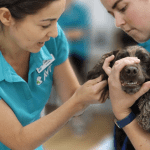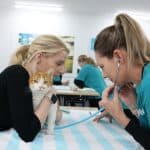For as long as you can remember, you have loved animals. And, for almost that long, you have dreamed about a career in the animal care industry. If you are like most people who have this dream, you have also thought long and hard about the best way to turn that dream into a reality. If you have been thinking about this for a while, you have probably realised that making your dream come true involves taking two important steps.
Step One: Exploring careers in animal care
Discovering whether a career in the animal care industry is right for you is the first step. This means, doing some research to understand the many animal care career paths open to you; everything from pet groomer to veterinary nurse to manager of an animal shelter. You will also need to take the time to learn about the tasks associated with each of those positions and find out if they meet your expectations. Finally, and most importantly, you may choose to volunteer at a local animal rescue organisation, to make sure that a career in animal care is right for you.
Step Two: Getting the education you need
As a result of your research, careful consideration and volunteer work, you are more convinced than ever that a career in animal care is the right path for you. Now it is time to get the certification you need to be a practising animal care professional. After reviewing several certificate programs available to you, you have settled on a qualification.
There is just one problem; you have always struggled to get good grades. In high school, it always seemed like you needed to study longer and harder than your classmates to get good grades. Now, you are wondering whether you have what it takes to get your certificate.
That is understandable. But here’s the thing. The fact that you have struggled with school does not mean you are a poor student. Odds are, it probably means you have bad study habits.

What are bad study habits?
Every student is different. This means the study habits that work for one person, won’t necessarily work for you. It also means that you need to take careful stock of the ways you study; learning what works and what doesn’t work for you. As Penn Foster points out, the first step in overcoming bad study habits is to recognise the problem:
“Bad study habits aren’t always easy to recognise. In fact, many of them begin as good habits that just … don’t work out. If you have ever put in tonnes of effort preparing for an exam, feeling sure that you will pass, only to get back a disappointing grade, you have probably been practising some bad study habits.”
Common bad study habits
As noted above, no two people study in precisely the same way; but there are some bad study habits that many students practise. Take a close look at the following 16 bad study habits, see if any of them apply to you and, if they do, create a plan for replacing them with good study habits.
Top 6 Bad Study Habits
Bad Study Habit No. 1 – Procrastination
Let’s be real; most students would rather watch their favourite TV programme than read about animal hygiene routines. And it is not that big a deal if you occasionally do just that; but you cannot make a habit of it. The simple fact is that, the longer you wait to complete your studies, the harder they are going to be, because you will need to study for longer stretches of time, due to the limited time you have left yourself, never giving your brain an opportunity to recharge. You might even need to skip meals or sleep just to get all your work completed before an assignment or exam is due. Take the time to see how often you are procrastinating in regards to your study. If it is more than a couple of times a week, it could be a problem.
Bad Study Habit No. 2 – Putting off the hard work
This one is closely related to procrastination. Some areas of your courses will come easy to you, while others will be more challenging. For example, you might enjoy learning about animal first aid but have a hard time dealing with an animal health assessment. If you put off the hard things to the last minute, it is likely to increase your stress level, making even the easy topics more challenging. In addition, putting off the hard work also means you will be tackling those difficult topics when you have the least amount of energy and time. If anything, strive to deal with the hardest work first, leaving the easier topics for later.
Bad Study Habit No. 3 – Getting distracted
If you find yourself saying things like “I study better with the TV on,” it is time for a reality check. Many of the topics you will be studying are technical and require your full attention. That means you need to remove all distractions during your study times. This includes television, radio, texting, making calls and checking your emails.
Bad Study Habit No. 4 – Not taking study breaks
To function effectively, your brain needs to rest from time to time. That means you will need to take occasional breaks to get the most out of your study. It is important that these breaks are scheduled as a regular part of your study sessions. That way you will ensure your brain gets the occasional rest it needs to be most effective.
Bad Study Habit No. 5 – Highlighting too much
Take a minute right now and pick up one of your textbooks. How much of the content is highlighted? If the answer is “a lot,” that could be a problem. When you are highlighting almost everything, then almost nothing stands out. Many students use highlighting as a substitute for internalising key facts and information. Instead of highlighting text, try making brief notes in the margin that summarise what is in a long passage. This will increase the odds you will remember the material in an exam or test.
Bad Study Habit No. 6 – Not practising good health habits
Your study habits are connected to your health habits. For example, if you do not get enough sleep or enough to eat, it is going to impact on how alert and focused you are. Most students have a busy lifestyle, but you cannot ignore basic biology. Make sure you are getting at least 8 hours of sleep and that you have 3 healthy meals every day. This will ensure that your mind is sharp and that your study sessions are effective.
In conclusion
Practising strong study habits will help you turn your dream of a career in animal care into a reality. Of course, like every student, you are likely to hit a few speed bumps along the way. That is where we can help. If you are a current student or looking to study with us, our student support team is here to help. Every member of our team has completed a qualification in some shape or form, and we are here to listen, help and mentor you. If you need assistance, be sure to reach out to us.
Looking for more tips on study?
Read more about goal setting, memory and tools you can use here:-
- How to set study goals to help you achieve more
- 4 Solid Tips to Improve your Memory and Advance your Career in Animal Care
- Top 5 Time Management Apps for Students
- 7 tips to juggle work and study in the animal care industry
No two people study in precisely the same way; but there are some bad study habits that many students practise!

Start your dream career!
Choose a course
Follow your passion and get a dream job!
About Our Courses
Choose from our range of courses
Flexible Online
ACM20121 Certificate II in Animal Care (Online)
Studying Online
Animal Care Online Course
About AVT
We have been training animal care, animal behaviour and training, equine care and veterinary nursing students for over 25 years in Australia. Students who undertake AVT courses range from high school-aged students just starting their pre-vocational journey right through to mature-aged students seeking an alternative career path. Graduates are highly respected and sought after by industry professionals, businesses and organisations. If you want the background knowledge and skills to help you secure your career in the animal care industry, check out our qualifications here or gain new skills by studying one of our short courses.









